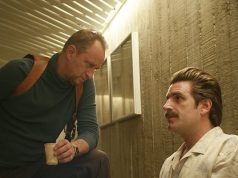Japan’s symbolic rising sun is in the process of setting in “The Sun” (“Solntse”), Russian filmmaker Aleksandr Sokurov’s haunting, hypnotic account of Emperor Hirohito’s actions in the final days of World War II.
What an anxious, contemplative movie this is! Sokurov, with a screenplay by Yuri Arabov, relates the story in a dreamlike fashion, focusing on Hirohito (Issei Ogata) as he continues to shuffle around his palace while his nation slowly loses its foothold in the war. With long, unbroken takes, Sokurov shows the emperor’s shrinking manservants — who, like all of Japan, deify Hirohito — waiting on his whims, eager to serve him and utterly fearful of his powers. His military advisers are more frightened of him than of the Allies.
The man himself is certainly not imposing, though. Ogata plays Hirohito as twitchy and preoccupied, a calm, almost bemused old figure who is starting to give in to despair and who holds out little hope for a Japanese victory. He moves slowly, just as all the other Japanese characters in the film do, as if under water. If this were a cartoon, they would all be portrayed as turtles.
While Hirohito’s people revere him as a literal descendant of the Sun Goddess, the American soldiers standing around outside the palace see him as a curiosity, something to be photographed on the rare occasions that he emerges. He reminds them of Charlie Chaplin, and he does exude a certain comical befuddlement.
When he meets with Gen. Douglas MacArthur (Robert Dawson) to discuss a possible outcome to the war — MacArthur wants him to renounce his godhood and accept the U.S.’s terms — he is by now too defeated to be offended by the general’s cavalier attitude. (“What’s it like being a living god?”)
Struggling to retain his dignity in the face of such monstrous humiliations, Hirohito is a poignant and tragic figure. This is a man with a scholar’s grasp of science and politics, yet who can’t (or won’t) dress himself or even open a door for himself. He has been treated like a god his entire life, and now he must not only admit military defeat, but “step down” as a divine being? Even as removed from such things as Western viewers are, we can see in Ogata’s performance the shame and abasement inherent in such a submission.
Sokurov keeps the film quiet, often dialogue-free, maintaining an ethereal mood throughout. He has also manipulated the film’s colors and lighting (he acts as his own cinematographer) to underscore his themes. The interiors appear brown and flat, and even the white exterior of the palace looks dingy. The film grows progressively darker and murkier as it goes, so that by the end you wonder if the theater’s projector bulb is burning out and causing an unintended dimness.
But no; it’s by design. (The fact that the closing credits are in bright white lettering is proof, if you need some.) As the sun sets on Japan’s glory and as its emperor sees his fortunes fade away, the film itself seems to sympathize. By the end, just like the emperor is metaphorically, we’re in a literal state of twilight, unable to see what lies ahead.
B+ (1 hr., 50 min.; Japanese with subtitles; )





